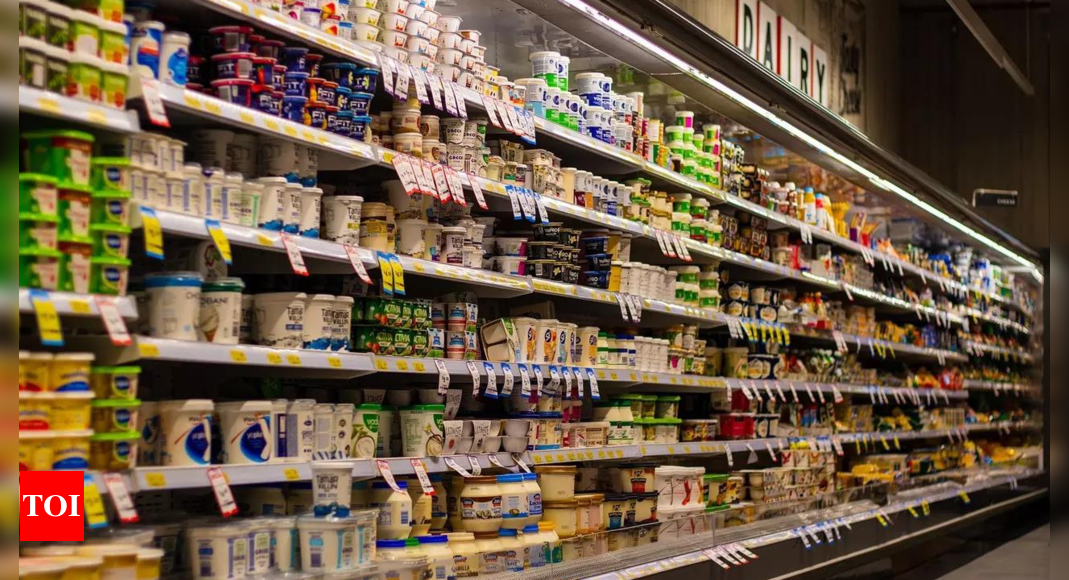
NEW DELHI: The Food Safety and Standards Authority of India, or FSSAI has approved changes to the nutritional information labelling on packaged food items during its 44th meeting, chaired by Apurva Chandra.
The proposed amendments to the Food Safety and Standards (Labelling and Display) Regulations, 2020 will require total salt, sugar, and saturated fat content to be displayed in bold letters and larger font sizes on food product labels.
In an official statement, Food Safety and Standards Authority of India (FSSAI) said it has approved “a proposal to display nutritional information regarding total sugar, salt and saturated fat in bold letters and relatively increased font size on labels of packaged food items”.
The draft notification for these changes will be made available for public comments and suggestions.
According to the amendments, the per-serve percentage contribution to Recommended Dietary Allowances (RDAs) for total sugar, total saturated fat, and sodium content will be highlighted in bold letters.
The FSSAI stated that regulation 2 (v) and 5(3) of the FSS (Labelling and Display) Regulation, 2020 specify the requirements for mentioning serving size and nutritional information on food product labels, respectively.
“The amendment aims to empower consumers to better understand the nutritional value of the product they are consuming and make healthier decisions,” the regulator was quoted as saying by news agency ANI.
“Along with empowering consumers make healthier choices, the amendment would also contribute towards efforts to combat the rise of Non-Communicable Diseases (NCDs) and promote public health and well-being,” the statement said.
The development of clear and distinguishable labelling requirements is a priority in the global effort to combat non-communicable diseases (NCDs). The FSSAI has been issuing advisories to prevent false and misleading claims, such as removing the term ‘Health Drink’ from e-commerce websites, as it is not defined or standardised under the FSS Act 2006 or its rules and regulations.
The regulator has also recently directed Food Business Operators (FBOs) to remove any claims of ‘100% fruit juices’ from the labels and advertisements of reconstituted fruit juices and to refrain from using the terms wheat flour or refined wheat flour.
The proposed amendments to the Food Safety and Standards (Labelling and Display) Regulations, 2020 will require total salt, sugar, and saturated fat content to be displayed in bold letters and larger font sizes on food product labels.
In an official statement, Food Safety and Standards Authority of India (FSSAI) said it has approved “a proposal to display nutritional information regarding total sugar, salt and saturated fat in bold letters and relatively increased font size on labels of packaged food items”.
The draft notification for these changes will be made available for public comments and suggestions.
According to the amendments, the per-serve percentage contribution to Recommended Dietary Allowances (RDAs) for total sugar, total saturated fat, and sodium content will be highlighted in bold letters.
The FSSAI stated that regulation 2 (v) and 5(3) of the FSS (Labelling and Display) Regulation, 2020 specify the requirements for mentioning serving size and nutritional information on food product labels, respectively.
“The amendment aims to empower consumers to better understand the nutritional value of the product they are consuming and make healthier decisions,” the regulator was quoted as saying by news agency ANI.
“Along with empowering consumers make healthier choices, the amendment would also contribute towards efforts to combat the rise of Non-Communicable Diseases (NCDs) and promote public health and well-being,” the statement said.
The development of clear and distinguishable labelling requirements is a priority in the global effort to combat non-communicable diseases (NCDs). The FSSAI has been issuing advisories to prevent false and misleading claims, such as removing the term ‘Health Drink’ from e-commerce websites, as it is not defined or standardised under the FSS Act 2006 or its rules and regulations.
The regulator has also recently directed Food Business Operators (FBOs) to remove any claims of ‘100% fruit juices’ from the labels and advertisements of reconstituted fruit juices and to refrain from using the terms wheat flour or refined wheat flour.







